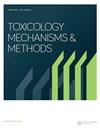Effects of pentachlorophenol and dichlorodiphenyltrichloroethane on secretion of interferon gamma (IFNγ) and tumor necrosis factor alpha (TNFα) from human immune cells
IF 2.8
4区 医学
Q2 TOXICOLOGY
引用次数: 10
Abstract
Abstract Pentachlorophenol (PCP) and dichlorodiphenyltrichloroethane (DDT) are pesticides that have been widely used and significantly contaminate the environment. Both are found in human blood and have been shown to alter the lytic and binding function of human natural killer (NK) cells. Interferon gamma (IFNγ) and tumor necrosis factor alpha (TNFα) are pro-inflammatory cytokines, which regulate immune responsiveness to pathogens and tumors. Their levels require very tight control to prevent loss of immune competence or excessive inflammation. Here, we examined the capacity of PCP and DDT to alter the secretion of these critical pro-inflammatory cytokines from increasingly reconstituted (more complex) preparations of human immune cells which included NK cells, monocyte-depleted (MD) peripheral blood mononuclear cells (PBMCs) (a preparation that is predominantly lymphocytes) and PBMCs (a preparation containing lymphocytes and monocytes). Results indicated that exposure to PCP decreased IFNγ secretion at the highest exposures (2.5 and 5 μM) and increased IFNγ secretion at lower concentrations. These effects were seen irrespective of the complexity of the cell preparation. PCP at 2.5 and 5 μM generally decreased TNFα secretion from NK cells, but had inconsistent effects in MD-PBMCs and PBMCs. Exposure of each of the immune cell preparations to DDT caused increase in IFNγ secretion. DDT (2.5 μM) increased TNFα secretion from MD-PBMCs after either 24 h or 48 h of exposure. The mechanism of PCP-induced increase in IFNγ secretion appears to involve the p38 mitogen activated protein kinase (MAPK) pathway, based on loss of PCP stimulated increase when this pathway was inhibited.五氯酚和二氯二苯三氯乙烷对人免疫细胞分泌干扰素γ (IFNγ)和肿瘤坏死因子α (TNFα)的影响
摘要五氯苯酚(PCP)和二氯二苯三氯乙烷(DDT)是被广泛使用且对环境污染严重的农药。两者都存在于人体血液中,并已被证明可以改变人体自然杀伤细胞(NK)的溶解和结合功能。干扰素γ (IFNγ)和肿瘤坏死因子α (TNFα)是促炎性细胞因子,可调节机体对病原体和肿瘤的免疫反应。他们的水平需要非常严格的控制,以防止丧失免疫能力或过度炎症。在这里,我们检测了PCP和DDT改变这些关键促炎细胞因子分泌的能力,这些促炎细胞因子来自日益重组(更复杂)的人类免疫细胞制剂,包括NK细胞,单核细胞耗尽(MD)外周血单核细胞(主要是淋巴细胞的制剂)和PBMCs(含有淋巴细胞和单核细胞的制剂)。结果表明,在最高暴露浓度(2.5 μM和5 μM)下,暴露于PCP使IFNγ分泌减少,在较低浓度下暴露于PCP使IFNγ分泌增加。这些效应与细胞制备的复杂性无关。2.5 μM和5 μM的PCP总体上降低NK细胞的TNFα分泌,但在MD-PBMCs和PBMCs中效果不一致。每一种免疫细胞制剂暴露于滴滴涕引起IFNγ分泌增加。DDT (2.5 μM)在暴露24 h或48 h后均可增加md - pbmc的TNFα分泌。PCP诱导IFNγ分泌增加的机制似乎涉及p38丝裂原活化蛋白激酶(MAPK)途径,基于PCP的丧失,当该途径被抑制时,刺激了IFNγ分泌的增加。
本文章由计算机程序翻译,如有差异,请以英文原文为准。
求助全文
约1分钟内获得全文
求助全文
来源期刊

Toxicology Mechanisms and Methods
TOXICOLOGY-
自引率
3.10%
发文量
66
期刊介绍:
Toxicology Mechanisms and Methods is a peer-reviewed journal whose aim is twofold. Firstly, the journal contains original research on subjects dealing with the mechanisms by which foreign chemicals cause toxic tissue injury. Chemical substances of interest include industrial compounds, environmental pollutants, hazardous wastes, drugs, pesticides, and chemical warfare agents. The scope of the journal spans from molecular and cellular mechanisms of action to the consideration of mechanistic evidence in establishing regulatory policy.
Secondly, the journal addresses aspects of the development, validation, and application of new and existing laboratory methods, techniques, and equipment. A variety of research methods are discussed, including:
In vivo studies with standard and alternative species
In vitro studies and alternative methodologies
Molecular, biochemical, and cellular techniques
Pharmacokinetics and pharmacodynamics
Mathematical modeling and computer programs
Forensic analyses
Risk assessment
Data collection and analysis.
 求助内容:
求助内容: 应助结果提醒方式:
应助结果提醒方式:


